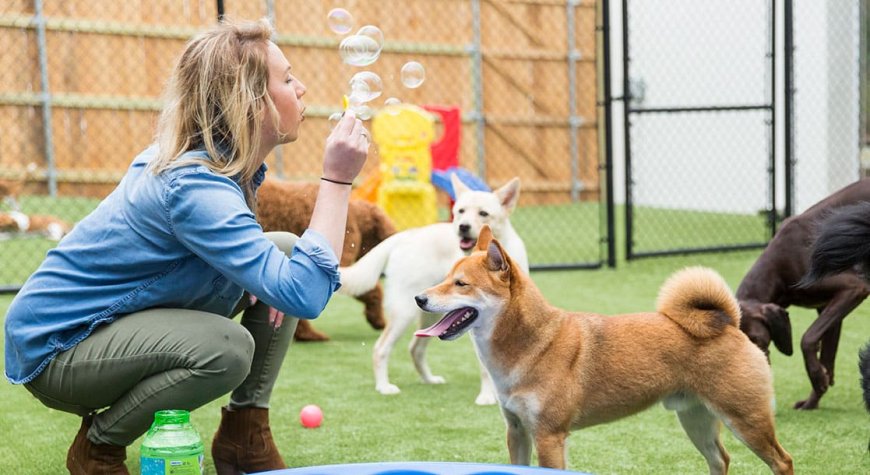The Power of Play: How Games Boost Your Pet’s Mental Well-being
Discover how games improve your pet’s mental well-being, reduce stress, and prevent boredom. Learn fun activities for dogs, cats, and more!

Playtime isn’t just about fun—it’s essential for your pet’s mental and emotional health. Whether it’s a game of fetch, a puzzle toy, or an interactive session with their favorite human, play engages your pet’s mind, reduces stress, and strengthens your bond.
Many pet owners focus on physical exercise but overlook the cognitive and emotional benefits of play. In this article, we’ll explore how games improve your pet’s mental well-being, the best types of play for different animals, and how to incorporate engaging activities into your pet’s daily routine.
Why Play is Essential for Your Pet’s Mental Health
Just like humans, pets need mental stimulation to stay happy and healthy. A lack of engagement can lead to boredom, anxiety, and even depression. Here’s how play benefits their mental well-being:
1. Reduces Stress and Anxiety
Play triggers the release of endorphins, the "feel-good" hormones, helping pets relieve anxiety and stress. Games that mimic natural behaviors, like hunting or chasing, provide an outlet for pent-up energy and frustration.
2. Prevents Boredom and Destructive Behavior
A bored pet can become a destructive pet. Chewing on furniture, excessive barking, or scratching at doors often stems from a lack of stimulation. Regular play sessions keep their minds occupied and prevent unwanted behaviors.
3. Strengthens Your Bond
Playing with your pet strengthens your relationship by building trust and companionship. Engaging in fun activities together reinforces positive interactions and deepens the emotional connection between pet and owner.
4. Encourages Problem-Solving Skills
Interactive toys and puzzle games challenge your pet’s brain, improving their problem-solving skills. This type of engagement is particularly beneficial for intelligent breeds like Border Collies, Siamese cats, and parrots, who thrive on mental challenges.
5. Boosts Confidence and Social Skills
Games encourage pets to explore new environments, interact with others, and develop confidence. Social play, such as playdates with other pets or training games, helps reduce fear and builds positive social behaviors.
Best Games to Enhance Your Pet’s Mental Well-being
Different pets have different play needs. Here are some engaging games tailored to various animals:
For Dogs:
- Hide and Seek: Hide in different areas of your home and call your dog’s name to encourage them to find you. This game stimulates their natural tracking instincts.
- Treat Puzzle Toys: Food-dispensing toys like KONGs or snuffle mats challenge your dog to work for their treat, keeping their brain engaged.
- Scent Tracking Games: Hide treats or toys around the house and let your dog sniff them out, engaging their natural hunting instincts.
- Tug-of-War: A fun way to strengthen their muscles while also reinforcing positive play behavior.
For Cats:
- Interactive Wand Toys: Mimicking the movement of prey, these toys trigger a cat’s hunting instincts and provide an excellent mental workout.
- Laser Pointer Chase: A simple yet effective way to keep your cat active and engaged (just make sure to end with a tangible reward).
- Cat Puzzle Feeders: These toys require cats to figure out how to retrieve their food, promoting problem-solving skills.
- DIY Box Mazes: Creating obstacle courses with cardboard boxes and tunnels provides hours of entertainment.
For Small Pets (Rabbits, Guinea Pigs, Ferrets):
- Foraging Games: Hide treats in hay piles or inside cardboard tubes to encourage natural digging and foraging behaviors.
- Tunnels and Mazes: Small pets love to explore. Set up tunnels, ramps, and obstacle courses for mental and physical enrichment.
- Rolling Treat Dispensers: These toys keep small animals engaged by rewarding them with treats as they figure out how to roll the dispenser correctly.
For Birds:
- Puzzle Toys: Birds, especially parrots, love interactive toys that require them to unlock compartments for treats.
- Talking and Singing Games: Encouraging your bird to mimic sounds and words strengthens their cognitive skills.
- Climbing and Swinging Activities: A play gym with ladders, swings, and ropes provides mental and physical stimulation.
How to Incorporate Play into Your Pet’s Routine
Consistency is key when it comes to playtime. Here’s how to make it a regular part of your pet’s daily routine:
✔ Set a Play Schedule: Even 10-15 minutes of focused playtime twice a day can make a significant difference in your pet’s mental well-being.
✔ Rotate Toys: To keep things interesting, switch out toys every few days to prevent boredom.
✔ Engage in Interactive Play: Playing together strengthens your bond and makes the experience more enjoyable for your pet.
✔ Observe Your Pet’s Preferences: Every pet has unique play preferences. Some may prefer solo puzzle toys, while others enjoy interactive chase games.
✔ End on a Positive Note: Reward your pet after playtime with a treat or affection to reinforce positive behavior.
The Long-Term Benefits of Play
A well-stimulated pet is a happy pet. Over time, regular play can lead to:
- Improved behavior and reduced anxiety
- Stronger cognitive function and better problem-solving skills
- Enhanced socialization and adaptability to new environments
- A healthier, more active lifestyle
Conclusion
The power of play goes beyond simple entertainment—it’s an essential part of your pet’s mental health and overall well-being. By incorporating fun and engaging activities into their daily routine, you’re not only preventing boredom and stress but also building a deeper bond with your furry (or feathered) friend.
So grab a toy, set aside some playtime, and watch your pet’s happiness soar!
What's Your Reaction?
 Like
0
Like
0
 Dislike
0
Dislike
0
 Love
0
Love
0
 Funny
0
Funny
0
 Angry
0
Angry
0
 Sad
0
Sad
0
 Wow
0
Wow
0



















































